初一英语时态知识点及练习一
初中英语动词的时态答题技巧及练习题(含答案)含解析
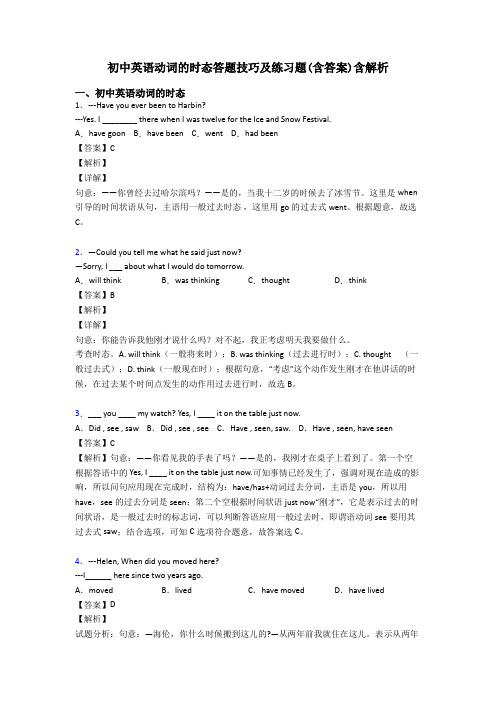
初中英语动词的时态答题技巧及练习题(含答案)含解析一、初中英语动词的时态1.---Have you ever been to Harbin?---Yes. I ________ there when I was twelve for the Ice and Snow Festival.A.have goon B.have been C.went D.had been【答案】C【解析】【详解】句意:——你曾经去过哈尔滨吗?——是的,当我十二岁的时候去了冰雪节。
这里是when 引导的时间状语从句,主语用一般过去时态,这里用go的过去式went。
根据题意,故选C。
2.—Could you tell me what he said just now?—Sorry, I ___ about what I would do tomorrow.A.will think B.was thinking C.thought D.think【答案】B【解析】【详解】句意:你能告诉我他刚才说什么吗?对不起,我正考虑明天我要做什么。
考查时态。
A. will think(一般将来时);B. was thinking(过去进行时);C. thought (一般过去式);D. think(一般现在时);根据句意,“考虑”这个动作发生刚才在他讲话的时候,在过去某个时间点发生的动作用过去进行时,故选B。
3.___ you ____ my watch? Yes, I ____ it on the table just now.A.Did , see , saw B.Did , see , see C.Have , seen, saw. D.Have , seen, have seen【答案】C【解析】句意:——你看见我的手表了吗?——是的,我刚才在桌子上看到了。
第一个空根据答语中的Yes, I ____ it on the table just now.可知事情已经发生了,强调对现在造成的影响,所以问句应用现在完成时,结构为:have/has+动词过去分词,主语是you,所以用have,see的过去分词是seen;第二个空根据时间状语just now“刚才”,它是表示过去的时间状语,是一般过去时的标志词,可以判断答语应用一般过去时,即谓语动词see要用其过去式saw;结合选项,可知C选项符合题意,故答案选C。
(完整版)初中英语各种时态练习题集锦
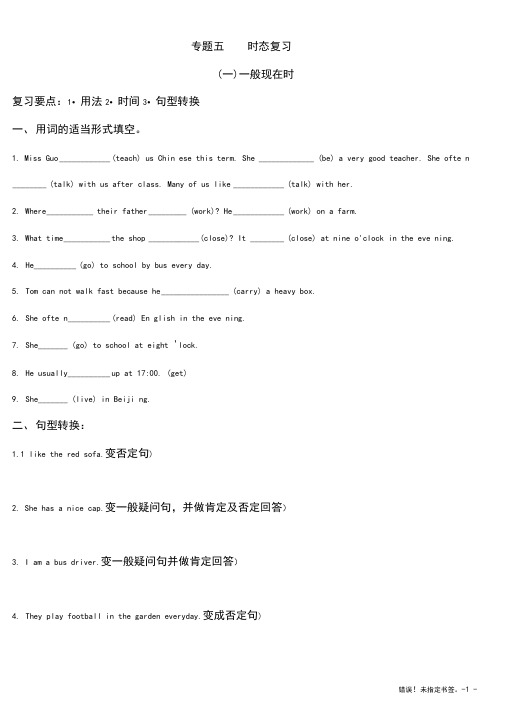
专题五时态复习(一)一般现在时复习要点:1•用法2•时间3•句型转换一、用词的适当形式填空。
1.Miss Guo ____________ (teach) us Chin ese this term. She _____________ (be) a very good teacher. She ofte n ________ (talk) with us after class. Many of us like ____________ (talk) with her.2.Where ___________ their father _________ (work)? He ____________ (work) on a farm.3.What time ___________ the shop ____________ (close)? It ________ (close) at nine o'clock in the eve ning.4.He__________ (go) to school by bus every day.5.Tom can not walk fast because he ________________ (carry) a heavy box.6.She ofte n __________ (read) En glish in the eve ning.7.She_______ (go) to school at eight 'lock.8.He usually __________ up at 17:00. (get)9.She_______ (live) in Beiji ng.二、句型转换:1.1 like the red sofa.变否定句)2. She has a nice cap.变一般疑问句,并做肯定及否定回答)3. I am a bus driver.变一般疑问句并做肯定回答)4.They play football in the garden everyday.变成否定句)5.There is an egg in the basket变成复数形式的句子)(二)一般过去时复习要点:1•用法2•时间3•句型转换一、将下列动词变成过去式。
初中英语时态讲解及练习(全)

时间状语:Tomorrow, next day(week, month, year…),soon, in a few minutes, by…,the day after tomorrow, etc.
否定形式:主语+am/is/are not going to do ; 主语+will/shall not do+其他 一般疑问句:be放于句首;will/shall提到句首。
1.I ____(write, am writing, is writing, are writing) a letter now. 2.Look, it _____(begin, is beginning, am beginning, are beginning) to rain. 3.They ____(study, is studying, am studying, are studying) medicine at the Medical Institute of Chengde these days. 4.He _____(teach, am teaching, is teaching, are teaching) an English lesson at this time.
谓语动词使用过去式形式, 加ed,分为规则和不规则变 化。表示过去经常发生的动 作,也可用“used to do ” 和“would +动词原形”。
1. He____(be, was, were, been) here a moment ago. 2. They ____(be, was, were, been) here just now. 3. The scientists _____(leave, leaves, leaved, left) for America yesterday. 4. Last week we ______(visit, visited ) the Science Museum. 5. When I was a child, I often ____(play, played) football. 6. The students ran out of the classroom as soon as the bell ____(ring, rang, rung).
初一英语四个时态练习题
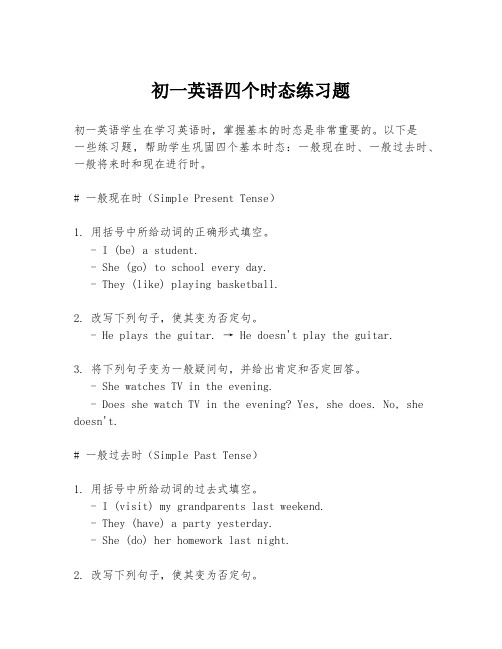
初一英语四个时态练习题初一英语学生在学习英语时,掌握基本的时态是非常重要的。
以下是一些练习题,帮助学生巩固四个基本时态:一般现在时、一般过去时、一般将来时和现在进行时。
# 一般现在时(Simple Present Tense)1. 用括号中所给动词的正确形式填空。
- I (be) a student.- She (go) to school every day.- They (like) playing basketball.2. 改写下列句子,使其变为否定句。
- He plays the guitar. → He doesn't play the guitar.3. 将下列句子变为一般疑问句,并给出肯定和否定回答。
- She watches TV in the evening.- Does she watch TV in the evening? Yes, she does. No, she doesn't.# 一般过去时(Simple Past Tense)1. 用括号中所给动词的过去式填空。
- I (visit) my grandparents last weekend.- They (have) a party yesterday.- She (do) her homework last night.2. 改写下列句子,使其变为否定句。
- We went to the park yesterday. → We didn't go to the park yesterday.3. 将下列句子变为一般疑问句,并给出肯定和否定回答。
- He read a book last night.- Did he read a book last night? Yes, he did. No, hedidn't.# 一般将来时(Simple Future Tense)1. 用括号中所给动词的正确形式填空。
初中中考英语知识点总结初中英语主要时态系列(一)—— 一般现在时讲解及练习

一、一般现在时有三种形式1. 谓语是be(am/is/are)的一般现在时。
①肯定形式:主语+be+表语(形容词、名词充当表语)。
I am hungry.You are beautiful.He is a doctor.②否定形式:主语+be+not+表语(形容词、名词充当表语)。
I am not hungry.You aren't beautiful.He isn't a doctor.③一般疑问句形式:Be+主语+表语(形容词、名词充当表语)? 肯定回答:Yes,主语+be. 否定回答:No, 主语+ be+not.—Are you hungry?—Yes,I am./No,I'm not.—Is he a doctor?—Yes, he is./No, he isn,t.④特殊疑问句形式:特殊疑问词+Be开头的一般疑问句?—What is he?—He is a doctor.注意:be要随着主语变。
2. 谓语动词是实义动词(及物动词或不及物动词)的一般现在时。
①肯定形式:“主语+及物动词+宾语”或“主语+不及物动词”。
She has a little brother.她有一个弟弟。
The sun rises in the east.太阳从东方升起。
②否定形式:“主语+don't/doesn't+及物动词+宾语”或“主语+don't/doesn't+不及物动词”。
She doesn't have a little brother.她没有弟弟。
I don't eat every morning.我每天早晨都不吃饭。
③一般疑问句形式:“Do/Does+主语+及物动词原形+宾语”或“Do/Does+主语+不及物动词原形”。
肯定回答:Yes,主语+do/does. 否定回答是:No, 主语+ don't/doesn't.—Do you eat every morning?—Yes, I do./No, I don't.—Does she have a little brother?—Yes, she does./No, she doesn't.④特殊疑问句:特殊疑问词+do/does开头的一般疑问句?What do you like?When do you go to school?注意:根据主语确定用do还是does。
初中英语八大时态全套精讲及练习题(附答案)
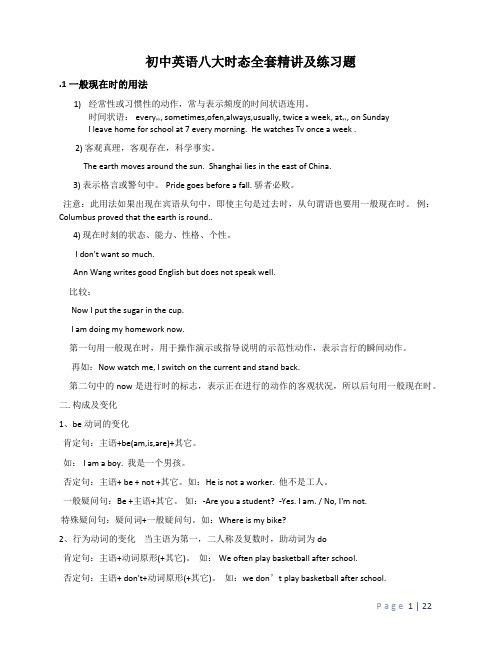
初中英语八大时态全套精讲及练习题.1 一般现在时的用法1)经常性或习惯性的动作,常与表示频度的时间状语连用。
时间状语: every…, sometimes,ofen,always,usually, twice a week, at…, on SundayI leave home for school at 7 every morning. He watches Tv once a week .2) 客观真理,客观存在,科学事实。
The earth moves around the sun. Shanghai lies in the east of China.3) 表示格言或警句中。
Pride goes before a fall. 骄者必败。
注意:此用法如果出现在宾语从句中,即使主句是过去时,从句谓语也要用一般现在时。
例:Columbus proved that the earth is round..4) 现在时刻的状态、能力、性格、个性。
I don't want so much.Ann Wang writes good English but does not speak well.比较:Now I put the sugar in the cup.I am doing my homework now.第一句用一般现在时,用于操作演示或指导说明的示范性动作,表示言行的瞬间动作。
再如:Now watch me, I switch on the current and stand back.第二句中的now是进行时的标志,表示正在进行的动作的客观状况,所以后句用一般现在时。
二. 构成及变化1、be动词的变化肯定句:主语+be(am,is,are)+其它。
如: I am a boy. 我是一个男孩。
否定句:主语+ be + not +其它。
如:He is not a worker. 他不是工人。
(英语)中考英语动词的时态(一)解题方法和技巧及练习题

(英语)中考英语动词的时态(一)解题方法和技巧及练习题一、初中英语动词的时态1.—I know you ______ to China many years ago. And how long have you ______ in China ?—I don’t remember it exactly.A.come; live B.came; comeC.come; come D.came; lived【答案】D【解析】句意:-我知道你多年前就来中国了。
你在中国住了多久了?-我记不太清了。
根据过去时间短语many years ago可知,谓语动词使用过去式came。
how long与持续性动词连用,live 是持续性动词,come暂时性动词。
根据语境可知,本句为现在完成时态,所以动词使用过去分词lived。
故选D。
2.— Who the classroom tomorrow, Tony?— Our group.A.will clean B.cleans C.cleaned D.clear【答案】A【解析】句意:——托尼,明天谁打扫教室?——我们小组。
考查一般将来时。
根据提示词tomorrow可知时态用一般将来时,其构成为:will+动词原形;故答案选A。
3.—May I speak to Mary?—Hold on, please.She_______in the kitchen.A.has cooked B.cooked C.will cook D.is cooking【答案】D【解析】句意:——我可以让玛丽接电话吗?——请不要挂断电话。
她正在厨房做饭。
根据Hold on, please.可知此处表示现在让对方别挂断电话,应是表示他找的玛丽正做某事,故用现在进行时be doing,故选D。
4.—I’m not sure if my sister Vivian ____________ the driving test next week.— Please let me know if she ____________ it.A.has passed; passes B.passed ; will pass C.passes; has passed D.will pass; passes 【答案】D【解析】句意:-我不确定我姐妹Vivian下周是否可以通过驾驶考试。
【英语】一般现在时知识点梳理及经典练习(超详细)1
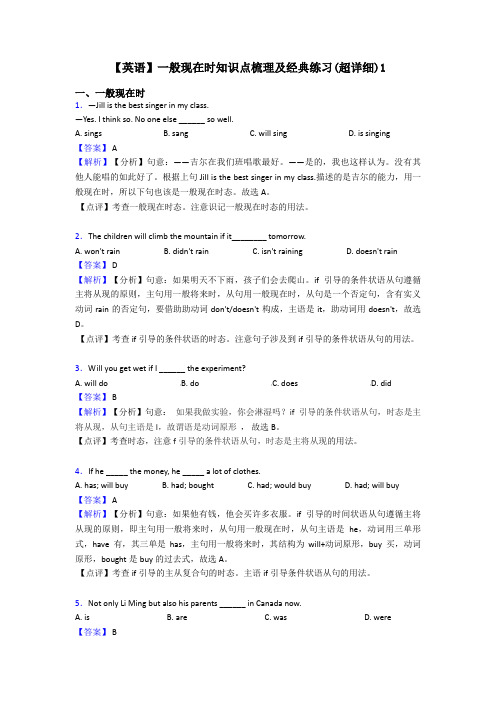
【英语】一般现在时知识点梳理及经典练习(超详细)1一、一般现在时1.—Jill is the best singer in my class.—Yes. I think so. No one else ______ so well.A. singsB. sangC. will singD. is singing【答案】 A【解析】【分析】句意:——吉尔在我们班唱歌最好。
——是的,我也这样认为。
没有其他人能唱的如此好了。
根据上句Jill is the best singer in my class.描述的是吉尔的能力,用一般现在时,所以下句也该是一般现在时态。
故选A。
【点评】考查一般现在时态。
注意识记一般现在时态的用法。
2.The children will climb the mountain if it________ tomorrow.A. won't rainB. didn't rainC. isn't rainingD. doesn't rain【答案】 D【解析】【分析】句意:如果明天不下雨,孩子们会去爬山。
if 引导的条件状语从句遵循主将从现的原则,主句用一般将来时,从句用一般现在时,从句是一个否定句,含有实义动词rain的否定句,要借助助动词don't/doesn't构成,主语是it,助动词用doesn't,故选D。
【点评】考查if引导的条件状语的时态。
注意句子涉及到if引导的条件状语从句的用法。
3.Will you get wet if I ______ the experiment?A. will doB. doC. doesD. did【答案】 B【解析】【分析】句意:如果我做实验,你会淋湿吗?if引导的条件状语从句,时态是主将从现,从句主语是 I,故谓语是动词原形,故选B。
【点评】考查时态,注意f引导的条件状语从句,时态是主将从现的用法。
【初中英语】一般过去时知识点梳理及经典练习(超详细)(1)

必备英语【初中英语】一般过去时知识点梳理及经典练习(超详细)一、初中英语一般过去时1.- Did you go to Li Lei's birthday party? - No, I ___________.A. am not invitedB. don't invite himC. wasn't invitedD. haven't invited【答案】 C【解析】【分析】句意:——你去参加李雷的生日聚会了吗?——没有,我没有被邀请。
根据句意可知用一般过去时的被动结构,故选C。
【点评】考查动词的时态和语态。
2.—Have you ever been to South Tower Park?—Yes. I ___________there a few months ago.A. wentB. have beenC. have gone【答案】A【解析】【分析】句意:—你曾经去过南塔公园吗?—是的,几个月前我去那儿了。
have been to曾经去过某地;have gone to去某地了;根据a few months ago.可知用一般过去时,动词用过去式,故选A。
【点评】考查动词时态辨析。
根据时间状语确定合适的动词。
3.The car suddenly _________ on the road and went out of control. Finally, it was seen _________ into the wall of the building.A. was broken down; crashB. broke down; crashC. was broken down; to crashD. broke down; to crash【答案】 D【解析】【分析】句意:汽车在路上突然加速,失去了控制。
最后,人们看到它撞到了建筑物的墙壁上。
break down和主语car是主动关系,故排除A和C,be seen to do,固定搭配,被看到做某事,故用不定式,故选D。
初中英语时态讲解及练习(含答案)

初中英语时态讲解及练习(含答案)时态1. 一般现在时●形式:do does(单数第三人称)●意义:一般现在时表示客观的、普遍性的真理以及经常性的事件。
●用法:A) 表示现在发生的动作、情况、状态和特征。
B) 经常性、习惯性动作。
e.g.:He always helps others. (他总是帮助别人。
)He often goes to the gym.C) 客观事实和普遍真理。
尤其要注意,如果前后文不是一般现在时,则无法保持主句、从句时态一致。
e.g.: The sun rises in the east and sets in the west.Knowledge is power.●这一用法场合一些表动作频率的时间副词连用:1). 表示肯定的频率副词:always, frequently, usually, sometimes, generally, occasionally, often etc.2). 表示否定的频率副词:never, seldom, rarely etc.这些副词的位置:在Be动词后,实义动词前。
e.g. He is always late.2. 一般过去时●形式:did●意义:一般过去时表示在过去的某一特定时间发生和结束的活动或情况。
●用法:A) 表示过去某个时间发生的动作或情况。
e.g.: I saw him in the library yesterday morning. (有特定的时间状语)yesterday, yesterday evening, last night/month/spring/year, the night before last(前天晚上),three days/months/years ago, in 1999 etc.。
这些时间状语之前不用加介词。
B) 表示过去习惯性动作,一直持续或反复发生的动作,此时可与表示拼读的时间副词连用。
e.g.: I slept for eight hours last night. (表示在过去某一段时间内持续的动作,但这动作现在已经结束了)3. 一般将来时●形式:will/shall do或be going to do●意义:一般将来时表示在未来的某个时间将要发生的某个动作或状态。
2021年初中英语语法知识—动词时态的知识点训练含答案(1)
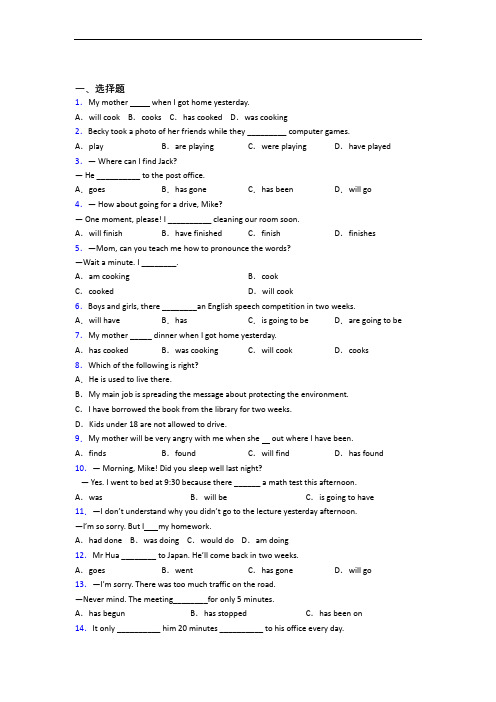
一、选择题1.My mother when I got home yesterday.A.will cook B.cooks C.has cooked D.was cooking2.Becky took a photo of her friends while they _________ computer games.A.play B.are playing C.were playing D.have played 3.— Where can I find Jack?— He __________ to the post office.A.goes B.has gone C.has been D.will go 4.— How about going for a drive, Mike?— One moment, please! I __________ cleaning our room soon.A.will finish B.have finished C.finish D.finishes 5.—Mom, can you teach me how to pronounce the words?—Wait a minute. I ________.A.am cooking B.cookC.cooked D.will cook6.Boys and girls, there ________an English speech competition in two weeks.A.will have B.has C.is going to be D.are going to be 7.My mother _____ dinner when I got home yesterday.A.has cooked B.was cooking C.will cook D.cooks 8.Which of the following is right?A.He is used to live there.B.My main job is spreading the message about protecting the environment.C.I have borrowed the book from the library for two weeks.D.Kids under 18 are not allowed to drive.9.My mother will be very angry with me when she out where I have been.A.finds B.found C.will find D.has found 10.— Morning, Mike! Did you sleep well last night?— Yes. I went to bed at 9:30 because there ______ a math test this afternoon.A.was B.will be C.is going to have 11.—I don’t understand why you didn’t go to the lecture yesterday afternoon.—I’m so sorry. But I my homework.A.had done B.was doing C.would do D.am doing12.Mr Hu a ________ to Japan. He’ll come back in two weeks.A.goes B.went C.has gone D.will go 13.—I'm sorry. There was too much traffic on the road.—Never mind. The meeting________for only 5 minutes.A.has begun B.has stopped C.has been on14.It only __________ him 20 minutes __________ to his office every day.A.takes;to drive B.take;drive C.takes;drive15.— Who ________the classroom tomorrow, Tony?— Our group.A.will clean B.cleans C.cleaned D.clean16.Miss Smith in our school since five years ago.A.teaches B.taught C.has taught D.is teaching17.— Look after yourself on your way to Gungzhou,dear.— OK, mom.I will call you________get there.A.as soon as B.so that C.because18.If Tina _____ at home tomorrow, I _____ her.A.is staying, will visit B.stays, will visit C.will stay, visit19.Look at Amy. She ________ for the school bus.A.wait B.is waiting C.waits D.waiting20.The film Operation Red Sea_____a lot of praise since its first show months ago.A.wins B.win C.will win D.has won21.It’s not your turn yet. Please wait on the chair until you________.A.have called B.will call C.are calling D.are called 22.Mr. Smith ______ our school next year.A.will visit B.visits C.was visiting D.visited23.—Did you hear the strange noise next door around 9 o’clock last night?— No, I ________my favourite film in my bedroom.A.watch B.watched C.am watching D.was watching 24.Sandy likes ________ TV. She ________ TV every day.A.watching; watching B.watch; watchesC.to watch; is watching D.watching; watches25.Doctor Ray, as well as other scientists __________ trees for nearly 15 years, but they know only a little about them.A.study B.studies C.has studied D.have studied【参考答案】***试卷处理标记,请不要删除一、选择题1.D解析:D【解析】句意:当我昨天回到家的时候,我的妈妈正在做饭。
(完整版)初一英语各种时态复习及练习题
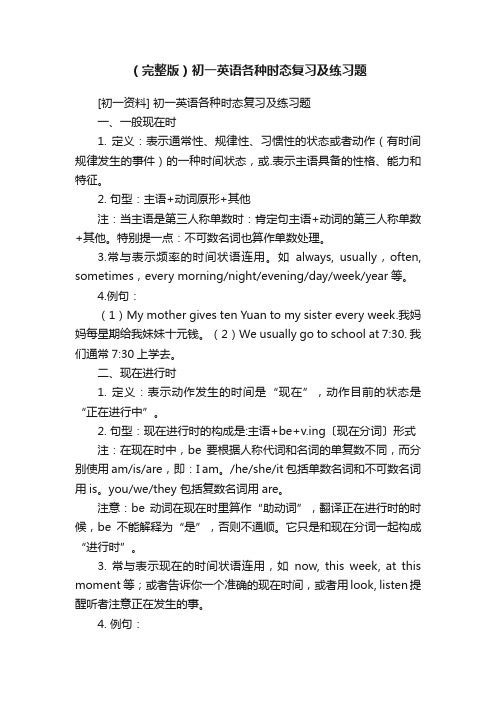
(完整版)初一英语各种时态复习及练习题[初一资料] 初一英语各种时态复习及练习题一、一般现在时1. 定义:表示通常性、规律性、习惯性的状态或者动作(有时间规律发生的事件)的一种时间状态,或.表示主语具备的性格、能力和特征。
2. 句型:主语+动词原形+其他注:当主语是第三人称单数时:肯定句主语+动词的第三人称单数+其他。
特别提一点:不可数名词也算作单数处理。
3.常与表示频率的时间状语连用。
如always, usually,often, sometimes,every morning/night/evening/day/week/year等。
4.例句:(1)My mother gives ten Yuan to my sister every week.我妈妈每星期给我妹妹十元钱。
(2)We usually go to school at 7:30. 我们通常7:30上学去。
二、现在进行时1. 定义:表示动作发生的时间是“现在”,动作目前的状态是“正在进行中”。
2. 句型:现在进行时的构成是:主语+be+v.ing〔现在分词〕形式注:在现在时中,be 要根据人称代词和名词的单复数不同,而分别使用am/is/are,即:I am。
/he/she/it 包括单数名词和不可数名词用is。
you/we/they 包括复数名词用are。
注意:be 动词在现在时里算作“助动词”,翻译正在进行时的时候,be不能解释为“是”,否则不通顺。
它只是和现在分词一起构成“进行时”。
3. 常与表示现在的时间状语连用,如now, this week, at this moment 等;或者告诉你一个准确的现在时间,或者用look, listen提醒听者注意正在发生的事。
4. 例句:(1)They are playing basketball now.现在他们正在打篮球。
(2)Listen! She is singing a song.听,她正在唱歌。
(英语)英语动词的时态常见题型及答题技巧及练习题(含答案)及解析
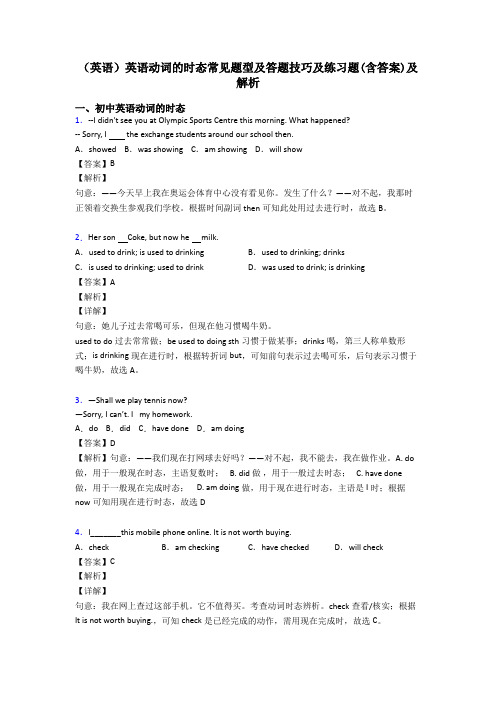
(英语)英语动词的时态常见题型及答题技巧及练习题(含答案)及解析一、初中英语动词的时态1.--I didn't see you at Olympic Sports Centre this morning. What happened?-- Sorry, I the exchange students around our school then.A.showed B.was showing C.am showing D.will show【答案】B【解析】句意:——今天早上我在奥运会体育中心没有看见你。
发生了什么?——对不起,我那时正领着交换生参观我们学校。
根据时间副词then可知此处用过去进行时,故选B。
2.Her son Coke, but now he milk.A.used to drink; is used to drinking B.used to drinking; drinksC.is used to drinking; used to drink D.was used to drink; is drinking【答案】A【解析】【详解】句意:她儿子过去常喝可乐,但现在他习惯喝牛奶。
used to do过去常常做;be used to doing sth习惯于做某事;drinks喝,第三人称单数形式;is drinking现在进行时,根据转折词but,可知前句表示过去喝可乐,后句表示习惯于喝牛奶,故选A。
3.—Shall we play tennis now?—Sorry, I can’t. I my homework.A.do B.did C.have done D.am doing【答案】D【解析】句意:——我们现在打网球去好吗?——对不起,我不能去,我在做作业。
A. do 做,用于一般现在时态,主语复数时; B. did做,用于一般过去时态; C. have done 做,用于一般现在完成时态; D. am doing做,用于现在进行时态,主语是I时;根据now可知用现在进行时态,故选D4.I_______this mobile phone online. It is not worth buying.A.check B.am checking C.have checked D.will check【答案】C【解析】【详解】句意:我在网上查过这部手机。
初中英语时态练习100题(附答案)

初中英语时态练习(1)1.I will tell him as soon as he _____ backA. comeB. comesC. will comeD. came2. Mary _____ on shoes when she ____ them.A. tries…buysB. tries… buiesC. trys… buysD. trys… buies3. The girl often ______ cold when she ______.A. cathcs…danc esB. catches… dancesC. catchs…danceesD. catches… dancee4. _____ he ____ himself there? No, I don't think so.A. Do…enjoyB. Does… enjoiesC. Does… enjoysD. Does…enjoy5. _____ your teacher ____ from them very often? Certainly.A. Do…hearB. Does…hearC. Do… receiveD. receive6. _____ your mother _____ some cleaning on Sundays?A. Does…doesB. Do…doesC. Does…doD. Do… do7. _____ Tom _____to work hard to help his family ? Yes, he _____.A. Has… x…doesB. Has…x…doesC. Does…has…hasD. Does… have…does8. Which teacher _____ lessons to you every day ?A. does …givesB. does… giveC. do… giveD. gives9. Smith does not go fishing on weekdays, ____? _____ , he does.A. does he…NoB. does he…YesC. doesn't he…NoD. doesn't he…Yes10.Mr Black often _____ fishing on Sundays, _____ he ?A. goes…doesn'tB. goes…isn'tC. doesn't go…doesD. doesn't go…is11.He usually _____ TV on Sunday evening.A. watchB. watchesC. watchingD. is watching12. We'll go to play with snow if it ______ tomorrow.A. snowB. snowsC. will snowD. snowed13. Neither I nor he ______ French.A. speakB. doesn't speakC. speaksD. doesn't speak14. Nobody ______ how to run this machines.A . know B. have known C. knows D. is knowing15. The Young Pioneer _____ water for the old man every day.A. carryB. bringC. takesD. carries16. Some are ______ in the river and some are ______ games.A. swimming… playingB. swimming…plaiingC. swimming… I playingD. swimming…plaing17. Look ! The boy students are _____ football while the girls are _____ .A. playing… danceB. playing… dancingC. play… dancingD. play… dance18. He _____ to do his lessons at eight every evening.A. is beginningB. is beginningC. beginD. begins19. _____ he _____ on well with his friends this term ?A. Does…getsB. Does…getC. Is…gettingD. Is…geting20. Mr Smith _____ short stories, but he ____ a TV play these days.A. is writing…is writingB. is writing… writesC. writes… is writingD. writes… writes 参考答案:1—5 BABDB 6—10 CDDBA 11—15 BBCCD 16—20 CBDCC初中英语时态练习(2)21. I _____ to the cinema. I ______ there every Sunday.A. go…goB. am going… goC. go… am goingD. am going…am going22. Look, they______ a good time, ____ they ?A. have…doB. have…don'tC. are having…areD. are having… aren't23. You ______ about the future now, ______ you ?A. don't think…don'tB. aren't thinking… aren'tC. don't think… doD. aren't thinking… are24. She always ______ something whenever she ______.A .s tudied…played B. studied…plaiedC.. studied…plaiedD. studied… played25. He often _____ late in the forest. It _____ me very much.,A. stayed…worriedB. staied… worriedC. stayed…worryedD. staied… worried26. I ______that the boy _____ with no tears in his eyes.A. noticed… cryedB. noticed… criedC. noticed…criedD. noticed… cryed27. We _____the floor and _____ all the windows.A. mopped… cleannedB. moped… cleanedC. mopped…cleanedD. moped… cleaned28. When I _____ the Children's Palace, the children _____ with joy.A. visited… jumppedB. visited… jumpedC. visited… jumpedD. visited… jumpped29. ______ a sports meet last Sunday ? Yes , they ______.A. Did they have… didB. Did they have… hadC. Had they... had D. Had they (i)30. ____ you _____out for a walk after supper ? Yes, I ______.A. Did…went…wentB. Did… go… wentC. Did... went... did D. Did... go (i)31. _____ Jack _____ on with his work or ______ to have a rest?A. Did… went… stoppedB. Did… go… stopC. Did… went… stopD. Did… go… stopped32. You gave them a talk two days ago, _____you ? Yes, I ______.A. did… didB. did… gaveC. didn't… didD. didn't… gave33. ____ your brother _____ a letter to ? My father.A. Who… wroteB. What…wroteC. Who did…writeD. What did… write34. They _____ about the TV news then in the sitting-room. They often ____ such talksA. talked…hadB. talk…haveC. were talking…hadD. are talking…have35. He ______ some cooking at that time, so _____ me.A. did… heardB. did… didn't hearC. was doing… heardD. was doing… didn't hear36. " _____ you angry then?" "They_ too much noise.”A. Are…were makingB. Were…were makingC. Are…madeD. Were… made37. This time yesterday Jack _____ his, bike. He _____ TV.A. repaired… didn't watchB. was repairing… watchedC. repa ired… watchedD. was repairing… wasn't watching38. We _____ for Tom at ten last Sunday. He often kept us ______.A. were waiting… waitingB. were waiting… waitC. waited… waitingD. waited… wait39. When you _____ at the door, I _____ some washing.A. k nocked… didB. was knocking… didC. knocked… was doingD. knock… am doing40. The boy_____ English on the radio when I _____ his door.A. learned… was openingB. was learning… openedC. learned… openedD. is learning… open参考答案:21-25 BDDDA 26—30 BCBAD 31—35 BCCCD 36—40 BDACB初中英语时态练习(3)41. When they______ through the forest, a bear _____ at them.A. walked… was comingB. were walking… cameC. were talking… comesD. walk… is coming42. A young man _____ her while she _____ her work .A. watched… was finishingB. was watching… finishedC. watched… finishedD. was watching… was finishing43. While mother _____ some washing, I ______ a kite for Kack.A. did… madeB. was doing… madeC. was doing… was makingD. did… was ma king44. I _____ myself French from 7 to 9 yesterday morning. I _____ to work.A. was teaching… didn't goB. taught… didn't goC. was teaching… wentD. taught… went45. He _____ a model plane when I came to see him.A. makesB. is makingC. was makingD. made46. I ______ a letter at nine last night.A. is writingB. was writingC. wroteD. is writing47. The teacher_____ (give) us a history lesson when Tom walked into the classroom.A. gaveB. is givingC. was givenD. was giving48. There will be a football match in two days, that is _______.A. last SundayB. next SundayC. every SundayD. this Sunday49. We ______ class meeting this November.A. hadB. haveC. will haveD. are having50. He ______ in his garden every morning next year.A. will workB. worksC. workedD. is working51. Be careful. The train ______.A. will comeB.C. comesD. is coming52. Look at those clouds. It _____ soon, I'm afraid.A. is going to rainB. is rainingC. will rainD. won't rain53. The radio says it ______ the day after tomorrow.A. is going to snowB. is snowingC. will snowD. snows54. _____ he _____ some shopping tomorrow afternoon ?A. Will…doesB. is going to doC. is…doingD. Shall… do55. What day _____ it ______ tomorrow ? Wednesday.A. is… going to beB. will…beC. shall…beD. does…be56. The boy _______ sixteen years old next year.A. is going to beB. is growing to beC. will beD. is57. _____ you ____ me up at six, please ?A. Are…going to wakeB. Are…wakingC. Will…wakeD. Do…wake58. If he ______ to college, he _____ a lot more.A. will go…will learnB. will go…is going to learnC. is going… is going to learnD. goes… will learn59. When she _____ next time ,l ______ her everything.A. is going to come…shall tellB. will come…shall tellC. comes…will tellD. come…will tell60. What day ____ it ____ tomorrow ? It ____Tuesday.A. is…going to be… isB. will…be…willC. is…going to be…is goingD. will be…will be参考答案:41-45 BDCAC 46—50 BDDCA 51—55 DACBB 56—60 CCDCD初中英语时态练习(4)61. She _____that she _____ her best to help them the next term.A. says…will doB. said…will doC. said… would doD. says…would do62. People _____ that the Smiths _____ for a holiday next week.A. say… will goB. said… will goC. said… would goD. say…would go63. Nobody _____ us that he _____ even stricter with usA. tell…will beB. tells…would beC. told…will beD. told…would be64. Please _____ him that we _____ able to help him.A. tell…will beB. tells… would beC. told…will beD. told… would be65. Jack _____ that they _____ surprised to see it this Friday.A. know… would beB. knows… will beC. knew… would beD. knew… will be66. I _____to know if Mary_____ by train that afternoon.A. want… would goB. want… will goC. wanted… would goD. wanted… will go67. _____ he _____ that they _____ home tomorrow?A. Does… learn… would goB. Does… learn… will goC. Did… learn… would goD. Did… learn… will go68. We _____ that they _____ a sports meet tomorrow.A. learn… would haveB. have learned… would haveC. learn… will haveD. have learned… will have69. ____ you _____ that he _____ his lost son one day ?A. Do…think…will findB. Do…thought…would findC. Did…think…will findD. Did…thought…would find70. I _____ that you _____ good care of her that day.A. thought…will takeB. thought…would takeC. think… will take B. think… would take71. The visitors _____ where they _____ a short test.A. ask… would takeB. ask… will takeC. asked… would takeD. asked… can take72. John ____ sure that he ____ good at chemistry soon.A. be… will beB. is, would beC. was… will beD. was… would be73. She ____ ill so she ____ able to go skating the next day.A. is… won't beB. is… wouldn't beC. was… won' beD. was… wouldn't be74. He _____ the thief to the police when he _____ the man again.A. would take… would meetB. would take…metC. will take… will meetD. will take… meet75. Mother ____ me a new coat yesterday, I _____ it on. It fits me well.A. has made…have triedB. made…have triedC. has made…triedD. made…tried76. " He ____ to draw horses already ."" When ____he ?”. " Last year. "A. learned...has B. learned...did C. has learned...has D. has learned (i)77. Tom ____ up into the tree. Look, he _____ high up there !A. has got… isB. has climbed… wasC. got… wasD. climbed… is78. _____you _____ the text yet ? Yes, we _____ it two hours ago.A. Did…copy…didB. Have… copied…haveC. Have… copied… didD. Did …copy…had79. "Why she angry?" "Because he _____ at he just now.A. did… get, shoutedB. has…got…shoutedC. did… get… has shoutedD. has…got…has shouted80. _____ you ______ the film before ? Where ____ you _____ it ?A. Have… seen… did… seeB. Did…see…die…watchC. Have…seen… have… seenD. Did…see…have…seen参考答案:61-65 CADAB 66—70 CBDAB 71—75 CDDBB 76—80 DACBA初中英语时态练习(5)81. You _____ me waiting for two hours. I _____ for you since five.A. Kept…waitedB. have kept…waitedC. kept…have waitedD. have kept…have waite d82. Where _____John _____? To the library. He _____ there for an hour.A. has… been … has goneB. has…gone…has beenC. did… go… wentD. did…be…went83. _____ the baby still _____ ? No, it ______ crying.A. Has… cried… has stoppedB. Is…crying…stoppedC. Did… cry… stoppedD. Is…crying…has stopped84. I _____ the way. I ______ here for quite many years.A. knew... have lived B. knew (iv)C. know... have lived D. know (iv)85. _____ you ever _____America ? Yes, I have.A. Have… gone toB. Have… gone inC. Have… been toD. Have… been in86. My brother _______ college for over three years.A. has gone toB. has been toC. has been inD. has been for87. He _____ the Army by the end of 1992. He ____ in the army since then.A. joined…isB. has joined…has beenC. had joined…isD. has joined… has been88. By the time I _____ back they ____ up ten metres.A. came…have climbedB. came…had climbedC. come…have climbedD. had come…climbed89. Jack ____ over five lessons by seven o'clock. Then he____ a test.A. went…tookB. went…had takenC. had gone…tookD. had gone…had taken90. We _____ out by that time that he ____ a thief for a long time.A. had found…had beenB. had found…wasC. found…had beenD. found…was91. Before the new _____ him, he ____ to know about it.A. reaches… has gotB. reached…had gotC. reached… gotD. had reached…got92. I _____ him a second letter before I _____ from him.A. wrote… heardB. wrote… had heardC. had written… heardD. have written… hear93. We _____ in a good harvest because we ______ enough rain.A. didn't get… had hadB. got… had hadC. had got… had badD. got… hadn't had94. They ____for five hours when they ____ in New York.A. flew…arrivedB. had flown…had arrivedC. flew…had arrivedD. had flown…arrived95. She ____ that ____ it for two days by that day.A. says…has rainedB. says…had rainedC. said… had rainedD. said…rained96. John _____ there since the year before, so he ____ them.A. had worked…knewB. had worked….had knownC. worked…knewD. worked…had known'97. He _____ angry because he _____ for a long time.A. had got…had waitedB. got…waitedC. had got…waitedD. got…had waited98. Paper _____ first invented in China.A. isB. areC. wasD. were99. The Greens _____ China for five years.A. has been inB. have been inC. went toD. has gone to100.There _____ an eraser under the desk. Is it yours ?A. isB. hasC. wasD. had参考答案:81-85 DBDCC 86—90 DDBCA 91—95 BCBDC 96-100 ADCBA。
初中英语时态知识梳理及练习题含答案
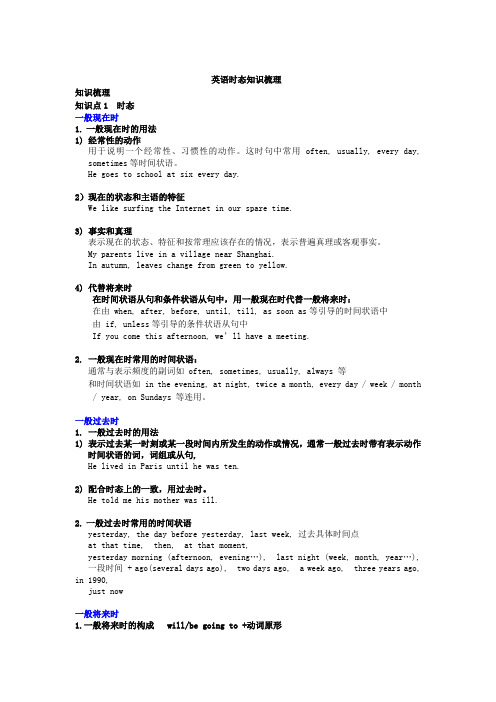
英语时态知识梳理知识梳理知识点1 时态一般现在时1.一般现在时的用法1) 经常性的动作用于说明一个经常性、习惯性的动作。
这时句中常用often, usually, every day, sometimes等时间状语。
He goes to school at six every day.2)现在的状态和主语的特征We like surfing the Internet in our spare time.3) 事实和真理表示现在的状态、特征和按常理应该存在的情况,表示普遍真理或客观事实。
My parents live in a village near Shanghai.In autumn, leaves change from green to yellow.4) 代替将来时在时间状语从句和条件状语从句中,用一般现在时代替一般将来时:在由 when, after, before, until, till, as soon as等引导的时间状语中由 if, unless等引导的条件状语从句中If you come this afternoon, we’ll have a meeting.2. 一般现在时常用的时间状语:通常与表示频度的副词如 often, sometimes, usually, always 等和时间状语如 in the evening, at night, twice a month, every day / week / month / year, on Sundays 等连用。
一般过去时1. 一般过去时的用法1) 表示过去某一时刻或某一段时间内所发生的动作或情况,通常一般过去时带有表示动作时间状语的词,词组或从句,He lived in Paris until he was ten.2) 配合时态上的一致,用过去时。
He told me his mother was ill.2.一般过去时常用的时间状语yesterday, the day before yesterday, last week, 过去具体时间点at that time, then, at that moment,yesterday morning (afternoon, evening…), last night (week, month, year…), 一段时间 + ago(several days ago), two days ago, a week ago, three years ago, in 1990,just now一般将来时1.一般将来时的构成 will/be going to +动词原形2. 一般将来时的用法1) will/won’t表示预测的将来,即认为某事肯定会发生;还可表示将来的意愿;将来的事实。
七年级上册英语 动词时态练习大全(100道)

七年级上册英语动词时态练习大全(100道)第一部分:选择题(每题2分,共20分)1. He _____ his keys on the table. (A. has B. have C. had D. having)A. has2. They _____ to the movies last night. (A. goes B. going C. wentD. gone)C. went3. We _____ to school by bus every day. (A. is going B. goes C. going D. went)D. went4. She _____ her homework at 7:00 PM every day. (A. has finishedB. finishC. finishingD. finishes)D. finishes5. He _____ his bike to school every day. (A. ride B. rides C. rodeD. riding)B. rides第二部分:填空题(每题2分,共40分)6. Sarah _____ (be) a teacher.is7. They _____ (go) to the park yesterday.went8. We _____ (do) our homework now.are doing9. He _____ (eat) dinner when I _____ (call) him.was eating; called10. She _____ (finish) her exam in an hour.will finish第三部分:改写句子(每题5分,共30分)11. They are playing soccer now. (改写为一般现在时) They play soccer now.12. She visited the museum yesterday. (改写为一般过去时) She visited the museum yesterday.13. He is finishing his homework. (改写为现在进行时)He is finishing his homework now.14. They will go to the beach. (改写为将来时)They will go to the beach tomorrow.15. I have finished my dinner. (改写为现在完成时)I have finished my dinner already.第四部分:翻译题(每题5分,共20分)16. 我每天早上七点去跑步。
【英语】一般现在时-知识点归纳与练习(1)
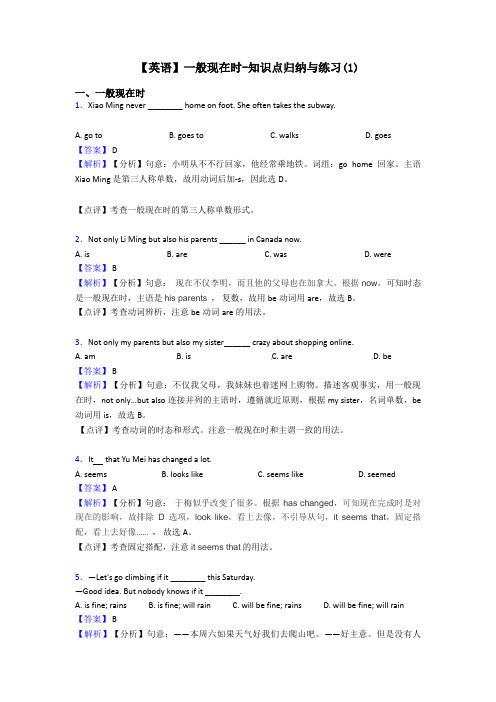
【英语】一般现在时-知识点归纳与练习(1)一、一般现在时1.Xiao Ming never ________ home on foot. She often takes the subway.A. go toB. goes toC. walksD. goes【答案】 D【解析】【分析】句意:小明从不不行回家,他经常乘地铁。
词组:go home回家。
主语Xiao Ming 是第三人称单数,故用动词后加-s,因此选D。
【点评】考查一般现在时的第三人称单数形式。
2.Not only Li Ming but also his parents ______ in Canada now.A. isB. areC. wasD. were【答案】 B【解析】【分析】句意:现在不仅李明,而且他的父母也在加拿大。
根据now,可知时态是一般现在时,主语是his parents,复数,故用be动词用are,故选B。
【点评】考查动词辨析,注意be动词are的用法。
3.Not only my parents but also my sister______ crazy about shopping online.A. amB. isC. areD. be【答案】 B【解析】【分析】句意:不仅我父母,我妹妹也着迷网上购物。
描述客观事实,用一般现在时,not only…but also连接并列的主语时,遵循就近原则,根据my sister,名词单数,be 动词用is,故选B。
【点评】考查动词的时态和形式。
注意一般现在时和主谓一致的用法。
4.It that Yu Mei has changed a lot.A. seemsB. looks likeC. seems likeD. seemed【答案】 A【解析】【分析】句意:于梅似乎改变了很多。
根据has changed,可知现在完成时是对现在的影响,故排除D选项,look like,看上去像,不引导从句,it seems that,固定搭配,看上去好像……,故选A。
英语时态知识点讲解及练习题

好的,以下是一套练习英语时态的习题:一、现在进行时1.We _______ (play) soccer on the field.2.They _______ (eat) pizza in the kitchen.3.She _______ (read) a book in the library.4.He _______ (write) an email at the computer.5.We _______ (talk) about the movie in the living room.二、一般现在时1.I _______ (go) to school every day.2.They _______ (watch) TV every evening.3.She _______ (have) lunch at noon.4.He _______ (play) video games on the weekend.5.We _______ (visit) our grandparents on Sundays.三、一般过去时1.He _______ (play) basketball yesterday afternoon.2.She _______ (see) a movie last night.3.We _______ (go) to the park last weekend.4.They _______ (have) a party two days ago.5.You _______ (sing) a song yesterday.四、一般将来时1.I _______ (fly) a kite tomorrow.2.We _______ (go) to the beach next month.3.She _______ (visit) her grandparents next week.4.They _______ (have) a picnic in the park this weekend.5.You _______ (play) with your friends this afternoon.一、现在进行时现在进行时表示正在进行的动作或发生的事情。
上册初中七年级英语 动词时态专项训练(100题)
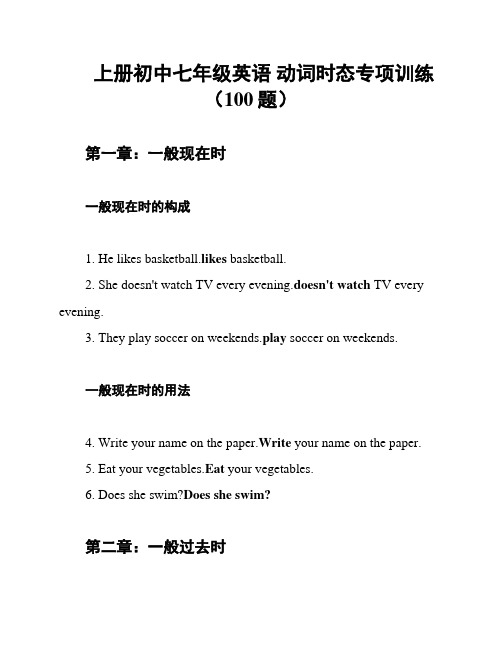
上册初中七年级英语动词时态专项训练(100题)第一章:一般现在时一般现在时的构成1. He likes basketball.likes basketball.2. She doesn't watch TV every evening.doesn't watch TV every evening.3. They play soccer on weekends.play soccer on weekends.一般现在时的用法4. Write your name on the paper.Write your name on the paper.5. Eat your vegetables.Eat your vegetables.6. Does she swim?Does she swim?第二章:一般过去时一般过去时的构成7. He ate pizza for lunch.ate pizza for lunch.8. She didn't go to the party last night.didn't go to the party last night.9. They played video games yesterday.played video games yesterday.一般过去时的用法10. Walked you to school yesterday?Walked you to school yesterday?11. Did he finish his homework?Did he finish his homework?12. Were they there when I called?Were they there when I called?第三章:一般将来时一般将来时的构成13. He will buy a new car.will buy a new car.14. She won't travel to Europe this summer.won't travel to Europe this summer.15. They are going to study abroad.are going to study abroad.一般将来时的用法16. Will you help me with this?Will you help me with this?17. Are they flying to New York?Are they flying to New York?18. Is he planning to attend the conference?Is he planning to attend the conference?第四章:现在进行时现在进行时的构成19. He is reading a book.is reading a book.20. She is cooking dinner.is cooking dinner.21. They are playing basketball.are playing basketball.现在进行时的用法22. Are you listening to me?Are you listening to me?23. Is he running late?Is he running late?24. Are they waiting for the bus?Are they waiting for the bus?第五章:过去进行时过去进行时的构成25. He was sleeping when I called.was sleeping when I called.26. She was walking in the park.was walking in the park.27. They were watching a movie.were watching a movie.过去进行时的用法28. Were you studying last night?Were you studying last night?29. Was he playing football?Was he playing football?30. Were they singing in the classroom?Were they singing in the classroom?第六章:现在完成时现在完成时的构成31. He has finished his homework.has finished his homework.32. She has visited Paris twice.has visited Paris twice.33. They have played soccer for an hour.have played soccer for an hour.现在完成时的用法34. Have you seen the movie?Have you seen the movie?35. Has he called you back?Has he called you back?36. Have they finished their project?Have they finished their project?第七章:过去完成时过去完成时的构成37. He had finished his meal before the meeting.had finished his meal before the meeting.38. She had visited the museum earlier in the day.had visited the museum earlier in the day.39. They had played basketball for an hour before the game.had played basketball for an hour before the game.过去完成时的用法40. Had you finished your homework before the teacher collected it?Had you finished your homework before the teacher collected it?41. Had he left the office before you arrived?Had he left the office before you arrived?42. Had they started the meeting when you arrived?Had they started the meeting when you arrived?第八章:被动语态被动语态的构成43. The book was written by him.was written by him.44. The cake was baked by her.was baked by her.45. The report was prepared by them.was prepared by them.被动语态的用法46. Was the window cleaned?Was the window cleaned?47. Were the tables set?Were the tables set?48. Was the presentation reviewed?Was the presentation reviewed?第四章:情态动词情态动词的用法49. He can swim.can swim.50. She may attend the party.may attend the party.51. They must finish their work.must finish their work.第五章:动词短语动词短语的用法52. He break the record.break the record.53. She call her friend.call her friend.54. They eat pizza.eat pizza.第六章:动词辨析动词辨析的用法55. He run faster than me.run faster than me.56. She jump over the fence.jump over the fence.57. They dance at the party.dance at the party. 答案答案解析- 答案:1. likes 2. doesn't watch 3. plays 4. Write 5. Eat 6. Does she swim? 7. ate 8. didn't go 9. played 10. walked 11. did he finish 12. were they there 13. will buy 14. won't travel 15. are going to study 16. will you help 17. are they flying 18. is he planning 19. is reading 20. is cooking 21. are playing 22. are you listening 23. is he running 24. are they waiting 25. was sleeping 26. was walking 27. were watching 28. were you studying 29. was he playing 30. were they singing 31. has finished 32. has visited 33. have played 34. have you seen 35. has he called 36. have they finished 37. had finished 38. had visited 39. had played 40. had you finished 41. had he left 42. had they started 43. was written 44. was baked 45. was prepared 46. was the window cleaned 47. were the tables set 48. was the presentation reviewed 49. can swim 50. may attend 51. must finish 52. break the record 53. call her friend 54. eat pizza 55. run faster than me 56. jump over the fence 57. dance at the party。
初一英语一般过去时详解及练习

• I.改错题
– How is Jane yesterday?was _____________________
– He gets to school at six yesterday. got s home at 6:00 last month. went
day? • 4.She washed the clothes last Sunday. ( 变否定句)
• She d__id__n_’t____w__a_s_h____ the clothes last Sunday
• 5. She is going to go shopping tomorrow. (变否定 句)
读音
例词
在浊辅音和元音后面 /d/
moved /mu:vd/
在浊辅音和元音后面 /t/
passed /pa:st/
在清辅音后面
/id/
needed /`ni:did/
清音更清 浊音更浊
将下列动词变为过去式
1. look 4. carry 7. call 10.are 13.do 16.say 19.eat
3.She stayed there for a week. (对划线部分提问) __H_o_w _lo_n_g_d_id___ she _s_t_a_y_ there?
4.There was some orange in the cup. (变一般疑问句) _W_a_s_ there _a_ny__ orange in the cup?
5. Last summer we ___________ (visit) Uncle Jack.
visited
6. It ___________ (rain) almost every day last month.
- 1、下载文档前请自行甄别文档内容的完整性,平台不提供额外的编辑、内容补充、找答案等附加服务。
- 2、"仅部分预览"的文档,不可在线预览部分如存在完整性等问题,可反馈申请退款(可完整预览的文档不适用该条件!)。
- 3、如文档侵犯您的权益,请联系客服反馈,我们会尽快为您处理(人工客服工作时间:9:00-18:30)。
时态复习的思维步骤应是:一时间、二主语、三动词。
一般现在时一、一般现在时的功能1.表示事物或人物的特征、状态。
如:The sky is blue.天空是蓝色的。
2.表示经常性、习惯性、预定性的动作。
如:I get up at six every day.我每天六点起床。
3.表示客观现实。
如:The earth goes around the sun.地球绕着太阳转。
4.一般现在时表将来——主将从现二、构成常与表示频率的时间状语连用。
如always, usually,often, sometimes,every三、重难点(1)第三人称单数变化i)在动词尾直接加 s。
如:play—plays, want—wants, work—works, know—knows, help—helps,get—getsii)以字母s、x、ch或o结尾的动词加-es;如:guess—guesses, fix—fixes, teach—teaches, brush—brushes,go—goes,do—does,watch—watches,catch—catchesiii)以辅音字母+y结尾的动词,先变y为i,再加-es。
如:study—studies,carry—carries,fly—flies,worry—worries(2)频度副词的位置及使用always, usually, often, sometimes, seldom, rarely ,never1.频度副词通常位于实义动词之前,动词be、助动词、情态动词等之后。
如:We often get together. Jane usually goes to work by bike.He sometimes goes there on business. He can never understand.I was never very good at maths.注:如果有两个助动词,频度副词通常放在第一个助动词后面。
如:Wehave never been invited to one of their parties. 他们聚会,一次也没邀请过我们。
She must sometimes have wanted to run away. 她有时候一定想到过要逃走。
2.频度副词位于句首的用法1). sometimes常可用于句首。
如:Sometimes she comes late. 有时她来得晚。
Sometimes she didn’t agree with me. 有时她和我意见不一致。
2). often用于句首时,通常表示强调,且其前一般有quite, very修饰。
如:Very often he comes in late. 他常常迟到。
Quite often thephone rings when I’m in the bath. 经常在我洗澡时响。
3) usually有时也用于句首,其前不用修饰语。
如:Usually I get Roman'我平时起得早。
四、课堂练习按照要求改写句子。
1.Do you often play football after school? (肯定回答)2.I have many books. (改为否定句)3.Gao Shan's sister likes playing table tennis (改为否定句)4.She lives in a small town near New York. (改为一般疑问句)5.I watch TV every day. (改为一般疑问句)6.David has got a goal. (改为一般疑问句)7.We have four lessons.(否定句)8.Nancy doesn't run fast (肯定句)9.My dog runs fast. 否定句、一般疑问句:10.Mike has two letters for him. 一般疑问句、否定句11.I usually play football on Friday afternoon. 否定句、一般疑问句、划线提问12.Mingming usually waters the flowers every day 否定句、一般疑问句、划线提问13.I do my homework every day .(改为一般疑问句并作否定回答)14. She likes milk.(改为一般疑问句并作肯定回答)用词的适当形式填空。
1. Miss Guo ______ (teach) us Chinese this term. She ______ (be) a very good teacher. She often ______ (talk) with us after class. Many of us like______ (talk) with her.2. Where ______ their father______ (work)? He ______ (work) on a farm.3. What time ______ the shop ______ (close)? It _____ (close) at nineo'clock in the evening. 4. He ______(go) to school by bus every day.5. Tom can not walk fast because he ______ (carry) a heavy box.把句子填写完整1. You forgot to do your homework. (rarely) 你几乎忘记了做你的作业。
2. English people shake hands. (seldom) 英国人很少握手。
3. He gets up at 6 o’clock every morning.(never) 他每天早晨从来不在六点钟起床。
4. We have seen such a beautiful sunset. (rarely) 我们很少看到如此美丽的日落。
5. They have breakfast at home. (seldom) 他们很少在家里吃早餐。
6. She is on time.( never) 她从来不守时。
7. Your grandparents go out for a walk. (hardly) 你的爷爷奶奶几乎不出去散步。
8. The sun rises in the west. (never) 太阳从来不在西边升起。
1. (2009·中考) -Does Alice often work until 2 a.m.?-No, she ________ does.A. nearlyB. certainlyC. seldomD. always4. (2009·中考) –I didn’t know you take a bus to school.-Oh, I ______ take a bus, but it is snowing today.A. hardlyB. neverC. sometimesD. usually9. (2009·阜康中考) -Were you often late for school last term, Tom?-No, _______. I got to school early every day.A. AlwaysB. UsuallyC. SometimesD. Never10. (2009·中考) –How often do you go to a concert?-_______ ever. I’m not interested in that at all.A. UsuallyB. HardlyC. Almost13. (2009·中考) -John sings so well. Has he ever been trained?-No. He learns all by himself. He¬¬________ goes to any training class.A. usuallyB. oftenC. neverD. even15. (2009·中考) –Miss Gao is very popular with her students.-Yes. Her classes are ______ lively and interesting.A. seldomB. neverC. sometimesD. always19. (2008·中考) We are going to have a party ________ next week.A. sometimeB. some timeC. sometimesD. some times21. (2008·中考) Sandy is so careful that she ________ makes mistakes in her homework.A. usuallyB. seldomC. oftenD. alwaysCDABCDACSometime 过去或未来的某一时间1)副词:某个时候。
可指过去或将来的某个时候。
如:①We’ll take our holiday sometime in August. 我们会在八月找个时间度假。
(将来)② I bought this sometime last summer. 这是我在上个夏天买的。
(过去)2)形容词:前,过去的。
意思类似former。
① This is our sometime general manager.这是我们的前任总经理。
② Our sometime classmate, Rose, is now a pop star. 我们以前的同学罗斯,现在是明星了。
Some time 某段时间。
常与for连用① We plan to stay in Hainan for some time. 我们打算在呆上一段时间。
② I will keep the computer for some time, so you can use it.这部电脑我会留着一段时间,你可以用。
sometimes副词:有时候。
顺便提一下,at times也是“有时”的意思。
Every man is a fool sometimes, and none at all times. 每个人有时都会犯傻,但没有谁会一直都傻。
